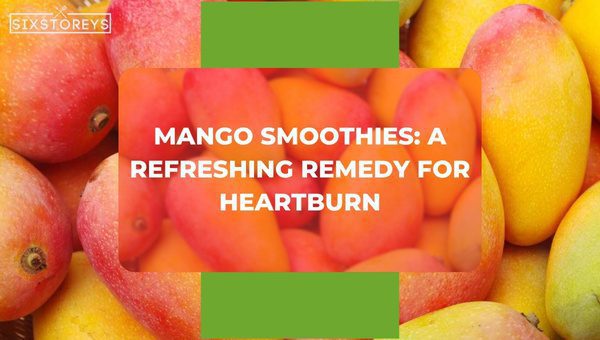Acid Test: Is Mango Acidic? Discover the Tangy Secret
Summer season means mango season, and who can resist the temptation of a ripe, succulent mango! Yet, this heavenly fruit is often subjected to a common question - "Is Mango Acidic?" Well, let's delve into the delicious world of mangoes and uncover some facts that might surprise you.
The sweetness and tropical aroma of mangoes are indeed unparalleled, but at times, the acidity could be problematic for some people. Whether you eat it dried, savor it perfectly ripe, enjoy it in a frozen treat, or relish a mango smoothie to beat the heat, understanding the acidity factor can prevent any unpleasant aftermath. Let's embark on this fruity journey and find out more about our beloved mangoes.
Also Read: Are Blackberries Acidic or Alkaline?
Article Includes
Is Mango Acidic?

Yes, mangoes are mildly acidic with a pH level ranging from 5.8 to 6.0. But let's not get too serious; we're here to have some fun with acidity and mangoes!
So, you're strolling through a mango orchard, and you can't help but wonder, "Are dehydrated mangoes spicier in the acidity department?" Hold on tight because we're about to peel back the juicy layers of this question.
Now, back to the basics. Acidity? It's all about how much acid is in something, measured on the pH scale from 0 to 14. If it's below 7, like mangoes, it's acidic; above 7, it's a different story. And remember, even a tiny pH change can make a big taste difference.
But why should you care about acidity? Well, your stomach loves a bit of acidity – it churns out hydrochloric acid for digestion. But your body as a whole prefers a pH that's chill and neutral, helping with digestion, immunity, and more.
Now, your diet. If you're chowing down on super-acidic stuff like lemons, you might end up feeling a bit off. But if you go the alkaline route with fruits and veggies, it's like an inner zen party.
Back to our star, the mango. It's got that mild acidity kick, but here's the twist – during digestion, those natural acids mellow out, giving your body a smooth alkaline ride. So, grab that mango and savor it without a worry in the world.
But wait, there's more! Wondering how other foods fare on the pH scale? Here's a taste:
- Banana: Slightly acidic at 5.0
- Lemon: Off-the-charts acidic at 2.0
- Processed Bread: Mild acidity at 5.0-6.0
- Beef: Also mildly acidic at 5.5-6.5
- Dark Chocolate: Striking a neutral chord at 6.0
- Green Beans: Mildly acidic at 5.5-6.0
So, next time you indulge in a succulent mango, remember, it's not just a fruit – it's a tangy, alkaline adventure for your taste buds and your well-being.
Do Frozen Mangoes Tip the Acidity Scale?
The next stop on our itinerary is frozen mangoes. Here's the thing - freezing doesn’t alter the inherent acidity of mangoes. The acidity of mangoes or pH level remains unchanged post-freezing.
Freezing and Acidity Levels
Freezing mangoes can be a fabulous way to enjoy this exotic fruit all year round. Yet, many are concerned that freezing might amplify the acidity in the fruit. Rest assured, freezing merely locks the current state of mangoes, preserving their freshness, sweetness, and yes, their pH levels too. So, the rumor of freezing mangoes raising their acidic abilities has been debunked!
Perfectly Ripe Mangoes and Their Acidity Levels

The ripening process does have an impact on a mango's acidity. The correlation between ripeness and acidity in mangoes is inverse – the more ripened the mango, the lesser its acidity.
The Maturation Spectrum of Mangoes
When it comes to mangoes and their acidity, ripeness plays a crucial role. As mangoes mature from their raw, green state to the sugary-sweet ripeness we enjoy, their acidity decreases. A raw mango is relatively high in tartaric acid, which contributes to its sour taste. As the mango ripens, the tartaric acid diminishes and natural sugars increase, resulting in a decrease in perceived acidity. For those sensitive to acidic foods, it’s certainly better to enjoy mangoes at their ripest.
Remember, while the processes of dehydration, freezing, and ripening might alter the taste intensity of mangoes, the actual acidity levels remain relatively stable. So, the answer to whether or not mangoes become more acidic when dehydrated, frozen, or ripe, is a resounding no. Instead, these different states just add variety to the same deliciously vibrant, yet slightly acidic, tropical fruit that we all adore.
Do Mangoes Play a Role in Acid Reflux & GERD?
Yes, mangoes can play a role in Acid Reflux and GERD, but it varies from person to person. Now, allow me to elaborate on exactly why this is so and delve more into why a person's unique physiology can have such a differing response to the same fruit.
Understanding Acid Reflux and GERD
In essence, acid reflux happens when stomach acid or bile flows back into the food pipe, causing a burning sensation in the heart area or throat, commonly referred to as heartburn. Frequent acid reflux might point to Gastroesophageal Reflux Disease (GERD), a chronic, more severe form of acid reflux.
Now, where do mangoes come into this equation? Well, mangoes are slightly acidic, and their natural sugars can ferment in the stomach, which can, in turn, lead to acid reflux. However, it's crucial to note that not everyone who eats mangoes will experience acid reflux or GERD symptoms. For some, the body can handle the fruit's mild acidity without any discomfort.
Individual Responses to Mangoes
Every person's body is unique, each with its own way of processing different foods. Some people might find the mild acidity of ripe mangoes soothing, while for others, it can be a trigger for acid reflux or GERD.
To understand if mangoes are triggering your acid reflux, keep a food diary. Track your food consumption and record any acid reflux symptoms that occur after eating. If you consistently notice symptoms after eating mangoes, they could be a trigger food for you.
Ripe vs. Unripe Mangoes
Ripe mangoes and unripe mangoes have different acidity levels. As mangoes ripen, their acidity lessens, and they become sweeter. Consuming unripe mangoes, with their higher acidity, can potentially trigger acid reflux. So, if you are sensitive to acid reflux or GERD, it will be better to consume ripe mangoes.
Consultation with a Healthcare Provider
If you frequently suffer from acid reflux or GERD and you find mangoes to be a trigger, consult with your healthcare provider. They could suggest dietary modifications, treatments, or medications to help control your symptoms. Tackling acid reflux or GERD often takes a multi-pronged approach, and diet is just one piece of the puzzle.
While mangoes can potentially play a role in acid reflux or GERD for some people, this is not the case for everyone. If you're unsure, the safest course of action is to seek advice from a healthcare professional to identify your trigger foods and devise a diet that suits your individual requirements. So, relish that mango, but do so with awareness, and most importantly, enjoy it mindfully.
Mango Smoothies: A Refreshing Remedy for Heartburn

How often have you found yourself washing heartburn go down with a soothing smoothie? Mango smoothies, surprisingly, might just be the answer to this. Despite being mildly acidic, mangoes, when combined with the right ingredients, can morph into a heartburn-quelling delight. Let's dive deeper into how you can enjoy this refreshing remedy next time heartburn strikes.
The Science Behind Mango's Effect on Heartburn
Mangoes have a moderate pH of around 6 but what makes them suitable as a heartburn remedy is not their acidity. Rather, it's the ripeness levels and what you pair your mango with your smoothie that make the real difference. Ripe mangoes are less acidic. They contain natural enzymes that aid digestion, which can help soothe symptoms of heartburn.
Furthermore, when paired with alkaline ingredients, the overall acidity of the smoothie is balanced out and it can provide relief from heartburn.
So, how can you whip up a mango smoothie that not only tastes divine but also keeps the heartburn at bay? Here are a few simple steps:
Creating a Mango Smoothie Recipe for Heartburn Relief
1. Choose ripe mangoes
The riper the mango, the lesser the acidity. So make sure the mangoes you're choosing for your smoothie are ripe.
2. Pair with alkaline ingredients
Some great choices here could be spinach, bananas, and almond milk. Banana offers natural antacids that may act against heartburn, while spinach is low-acid. Almond milk is naturally alkaline, making it an ideal dairy-free choice for reflux sufferers.
3. Chill and Serve
After blending the ingredients together, let your smoothie chill for a bit before serving. This not only enhances the taste but it can also soothe the warmth often experienced during heartburn.
Creating The Perfect Mango Smoothie
- Ingredients:
- 1 ripe Mango
- 1 Banana
- 1 handful Spinach
- 1 cup Almond Milk
- Peel and dice the ripe mango and banana
- Add the diced fruit, spinach, and almond milk into a blender.
- Blend until smooth.
- Pour it into a glass, and your Mango Smoothie is ready to serve.
This recipe ultimately results in a balanced smoothie that can handle heartburn issues while ensuring a delightful sip after sip. Remember, if you're a chronic heartburn sufferer, it's always good to consult a doctor or dietitian for personalized dietary advice.
A well-made mango smoothie can serve as a both nourishing and heartburn-friendly addition to your diet. Moderation is key here, and as long as you adhere to that, you can enjoy a refreshing mango smoothie without triggering any heartburn. Enjoy!
Reducing Acidity in Mangoes: A Handy Trick

Have you ever bitten into a mango, expecting it to be sweet and delicious, only to wince at the unexpected sourness? If so, you've experienced the acidity of a mango firsthand. But before you give up on mangoes, remember that there are quick and simple ways you can use to reduce their acidity to enjoy them more.
Choosing the Right Mangoes
The first step in reducing acidity is to be careful when selecting your mangoes. Ripe mangoes are usually less acidic compared to their unripe counterparts. Therefore, ensure the fruit is fully ripe and soft to touch before you consume it.
Utilizing Natural Sweeteners
Sweeteners can play a key role in offsetting the sourness from unripe mangoes. Drizzling a little honey, sprinkling some sugar or adding some maple syrup helps to balance the acidic taste. Be sure to stir it well, so the sweeter flavor blends evenly.
Combining with Alkaline Foods
Pairing your mango with some alkaline foods can also help combat its acidity. Here's a quick list showing you some good alkaline food matches for your mango:
- Avocado
- Banana
- Spinach
- Almond milk
Preparing a Balanced Meal
A well-balanced meal can contribute to reducing the overall acidity. For instance, you can prepare a hearty mango salad by tossing both ripe mango chunks and veggies like bell peppers, spinach, and cucumbers alongside some roasted chicken.
Reducing the acidity in mangoes is not a complicated task as you might think. A few simple tricks can transform that sour, acidic taste into a sweeter and more palatable experience. So, the next time when life gives you an acidic mango, you know exactly what to do!
Reaping the Health Benefits of Mangoes
Indeed, mangoes are slightly acidic. Yet, this does not diminish the fact that they offer amazing health benefits. The key to reaping these health benefits is understanding that every part of the mango – from its skin to its sweet flesh - offers valuable nutrients.
Packed with Vitamins and Minerals
Firstly, mangoes are an excellent source of Vitamins A and C. They offer a generous dose of these essential nutrients. In fact, one cup of raw, sliced mangoes covers a whopping 76% of the daily recommended intake of Vitamin C, and 25% of Vitamin A. These vitamins are critical to our immune system and eye health.
In addition, mangoes deliver ample amounts of Vitamin E, K, and several B vitamins. They also house a good share of potassium, a crucial mineral for maintaining healthy heart function and balancing fluid levels in our body.
Antioxidant-Rich
Secondly, mangoes are powerhouses of antioxidants, including mangiferin, a compound that is unique to mangoes. Antioxidants help neutralize harmful free radicals in our body, thereby protecting us from chronic diseases like heart disease, diabetes, and various types of cancer.
Promoting Gut Health
Finally, the dietary fiber present in mangoes contributes significantly to a healthier gut. Regular consumption of mangoes can improve digestion, prevent constipation, and maintain a healthier microbiota balance in our gut.
So, despite the mild acidity of mangoes, it is evident that this remarkable fruit has an astounding range of health benefits. Consume them wisely and in the right quantity, and you can easily extract the maximum nutritional perks offered by this "king of fruits".
Are Mangoes a No-No for Acid Reflux?

The short answer to this is - It depends. Like many fruits, mangoes are slightly acidic, which might cause concern for those suffering from acid reflux or GERD (Gastroesophageal Reflux Disease). However, everyone reacts differently, and while some acid reflux sufferers may tolerate them just fine, others might find Mangoes triggering their symptoms.
Understanding GERD
GERD is a digestive disorder that occurs when stomach acid frequently flows back into the tube connecting your mouth and stomach (esophagus). Certain foods and drinks can trigger a GERD reaction, causing discomfort and heartburn.
Assess Your Tolerance Level
For some people, consuming mangoes can cause symptoms of acid reflux to flare up due to the fruit's natural acidity. However, that doesn't necessarily mean you should cut mangoes out from your diet entirely. The key to consuming mangoes if you have acid reflux is to assess your individual tolerance. Start with a small quantity and observe for any adverse reaction.
Balancing Diet
It's also essential to strike a balance in your diet. If you pair mango with more alkaline foods, it actually can help neutralize the acidity. For example, eating a ripe mango with a handful of raw almonds, which are quite alkaline, might ease acid reflux symptoms.
Consult a Nutritionist or a Doctor
When you're dealing with a condition like GERD, it's always a good idea to consult a health professional. A nutritionist or a doctor can provide tailored advice based on your health history and symptoms that might help you safely include mangoes in your diet.
Remember, it's your body, and you know it best. Just because mangoes can possibly lead to acid reflux, doesn't mean they will for you. Ultimately, it's about finding a happy medium and figuring out what foods work best for your body.
Does the Raw Version of Mango Promote Acidity?
The answer to this question is a resounding yes. Raw mangoes, or unripe mangoes, can indeed cause an increase in the acidity levels in your stomach.
Why Raw Mangoes Promote Acidity
To understand why raw mangoes contribute to acidity, one has to delve a little into the biochemistry involved. Raw mangoes contain a high concentration of tartaric acid, a naturally occurring organic acid. Tartaric acid is known for its sour taste, which many associate with raw mangoes. The presence of this acid in such large amounts can lead to an acid-base imbalance in your stomach, causing the unsettling sensation of acidity.
This doesn't mean you need to entirely avoid eating raw mangoes. It simply highlights the potential for discomfort if you have a sensitive stomach, particularly acidic foods. You can certainly enjoy raw mangoes without experiencing acidity by practicing moderation and ensuring the fruit is part of a mixed meal, with other non-acidic elements.
We often find raw mangoes included in dishes in many cultures worldwide due to their unique taste. Popular recipes include aam panna, a traditional Indian summer drink made of green mangoes, or pickled mangoes, a favorite treat throughout Asia and the Caribbean. Both of these are perfect examples that balance the tartness of the raw mango with other flavors and spices, mitigating the potential for increased acidity.
While raw mangoes can cause acidity, this is not a problem for everyone. Each person's tolerance to acidic food is different, and it’s all about understanding your unique dietary needs and maintaining balance. And as always, if you have persistent issues with acidity or other digestive concerns, it’s a good idea to consult with a healthcare provider.
Can Mangoes Affect Teeth due to their Acidity?
Yes, the acidity in mangoes can potentially impact your dental health. Mental note, a food's acidity is measured via a pH scale. While mangoes typically sit at a moderately acidic range, consistent exposure can harm your pearly whites.
How Acidity Harms Your Teeth
To begin with, understand that the enamel, the hard, outer layer of your teeth, is vulnerable to erosion resulting from frequent exposure to acidic foods and beverages, including mangoes.
As we chat about acidity, our saliva has a neutral pH, which is around 7. It naturally neutralizes the acid in what we eat and drink, providing a buffer for the enamel. However, the consistent consumption of acidic foods can overpower the neutralizing ability of the saliva, paving the way for an erosive process which ultimately could lead to cavities.
Dental Symptoms Indicating an Acid Problem
There's a list of red flags to look out for, indicating that the acidity in your diet could be impacting your dental health:
- Sensitivity to hot or cold food and drinks.
- Discoloration of the teeth.
- Rounded teeth.
- Translucent or see-through teeth.
- Cracked edges on the teeth.
Protecting Your Teeth
Before you start worrying, it's worth mentioning that you don't have to banish mangoes and other slightly acidic foods from your diet. Here are a few ways to help protect your teeth:
- Drink water after consuming a mango to wash away the acid.
- Wait about an hour after eating acidic foods before brushing your teeth. Brushing immediately can damage the enamel, which can be soft following acid exposure.
- Use a toothpaste containing fluoride to strengthen your teeth.
While the acidity in mangoes can influence your dental health, smart habits and care can help safeguard your teeth from potential harm. So, enjoy your mangoes without worry, but remember moderation is the key, and keep prioritizing dental hygiene.
Can Pregnant Women Eat Mangoes Safely?

Yes, pregnant women can safely eat mangoes. However, there are a few caveats to consider. Pregnancy often brings with it several dietary restrictions and precautions, as what you consume not only impacts your health but at the same time affects your little one's growth and development.
Nutrient-Rich and Beneficial
Mangoes are an excellent source of many essential nutrients, including Vitamin A, Vitamin C, and fiber, all of which are needed for a healthy pregnancy. Vitamin A helps in the growth and differentiation of cells in the developing fetus. Vitamin C aids in the absorption of iron and is well-known for its immunity-boosting properties. The fiber in mangoes aids digestion, helping to alleviate one of pregnancy's common issues - constipation.
Modifying Mango Consumption in Pregnancy
However, while mangoes are generally beneficial, they need to be eaten in moderation, as they are also high in sugar content. Also, pregnant women are advised to avoid eating raw mangoes as they contain a high amount of latex and may lead to uterine contractions. Always remember, intake should be balanced with other nutritious fruits and veggies to maintain a varied and healthy diet.
Avoid eating mangoes that have been cut and left open for long due to potential bacterial contamination. Always aim to consume fresh and thoroughly washed mangoes to minimize risk.
Mangoes, when eaten in moderation and handled hygienically, are not only safe but can also provide valuable nutrients contributing to a healthy pregnancy. However, if a pregnant woman has a specific health condition or notices any discomfort after consuming mangoes, it’s always advisable to consult with a healthcare professional.
Understanding the Difference: Sour Mangoes vs. Sweet Mangoes - Do Acidity Levels Vary?

When we think about the differences between sour and sweet mangoes, the most noticeable contrast lies in their taste. Yet, it's a valid query - does the acidity level of a mango depend on whether it is sweet or sour?
Variety and Maturity: Key Factors for Acidity
Primarily, there are two factors at work here - the variety of the mango and its stage of maturity. There are hundreds of mango varieties, each having different flavors which can range from super sweet to tangy. Generally, sour mangoes often tend to be more acidic than their sweet counterparts. This is because, as a mango ripens, its tartaric and citric acid content decreases, and the sugar level increases, bringing about the characteristic sweet flavor.
Effects of Acidity for Sweet and Sour Mangoes
As for the effects of these varying acidity levels, you might notice a sour mango may seem tangier to your taste buds and could potentially cause more impact on your gut if you are sensitive to acidic foods. In contrast, sweeter mangoes, particularly when they're ripe, are far less likely to cause any digestive unease due to their lower acidity.
How to Balance the Acidity
However, if you have a preference for sour mangoes, but are concerned about the acidity, there are ways to balance it out. For example, you can prepare your mango with a pinch of salt or a dribble of honey. This helps to neutralize the acidity and brings out a delightful flavor, that very well may become your new favorite way of enjoying this tropical fruit!
To sum up, yes, acidity levels do vary between sour and sweet mangoes. Yet, with the right preparation, you can still enjoy your preferred variety without any worry.
Use this table to see the general nuances between sweet and sour mangoes:
| Type of Mangoes | Acidity Levels | Taste | Digestive Impact |
| Sweet Mangoes | Lower | Sweet, less tangy | Less likely |
| Sour Mangoes | Higher | More tangy, less sugary | Potentially higher |
Remember, balance is key. Mangoes, sour or sweet, are an excellent source of several vital nutrients and are phenomenally delicious in their own unique ways. Whether you opt for sour mangoes or sweet ones, you're in for a healthy, tantalizing treat.
Also Read: What is Brooklyn Style Pizza?
Frequently Asked Questions
Are Mangoes Acidic?
Indeed, mangoes contain natural acids such as malic, citric, and tartaric acids that give them a certain level of acidity. However, the acidity decreases as the mango ripens, resulting in the sweet taste we all know and love.
Is it safe for GERD patients to consume mangoes?
It depends on the individual as triggers for GERD vary from person to person. While mangoes might cause discomfort in some due to their acidity, others might be perfectly fine having them.
Can ripe mangoes still be acidic?
Yes, even ripe mangoes contain some amount of natural acids. However, as they mature and ripen, the acidity reduces, making them sweeter.
Can mangoes contribute to acid reflux?
While mangoes, due to their acidic nature, can potentially contribute to acid reflux, individual responses can vary greatly. If you're prone to acid reflux, it's advisable to monitor your reactions to mangoes.
Does freezing mangoes reduce their acidity?
No, freezing does not alter the inherent acidity of the mangoes. Whether they are eaten fresh or frozen, the acidic content remains fairly constant.
Are dried mangoes less acidic than fresh ones?
The drying process doesn't reduce the acidity of mangoes significantly. Dried mangoes could possibly taste more acidic due to the concentrated flavors.
Can raw mangoes cause acidity?
Indeed, raw mangoes can potentially cause acidity as they contain higher levels of tartaric acid than their ripe counterparts.
Can the acidity of mangoes harm my teeth?
The natural acids in mangoes have the potential to damage tooth enamel if consumed in excessive quantities. Always remember to rinse your mouth well after eating mangoes to safeguard your oral health.
Wrapping It Up
At the end of the day, the answer to the question, "Is Mango Acidic?" is yes. Nevertheless, this doesn't mean you should skip out on this fantastic fruit! The key lies in consumption moderation and knowing your body's tolerance. Well-ripened mangoes have lower acidity levels and can even soothe acidity in some cases when paired with alkaline foods. Above all, remember, nutritionally, mangoes are a powerhouse, providing a host of health benefits. Their acidity should not deter your love for this tropical delight. Happy mango munching!
Note: Always consult with a healthcare professional if you have chronic acidity or GERD before making any drastic changes to your diet.

